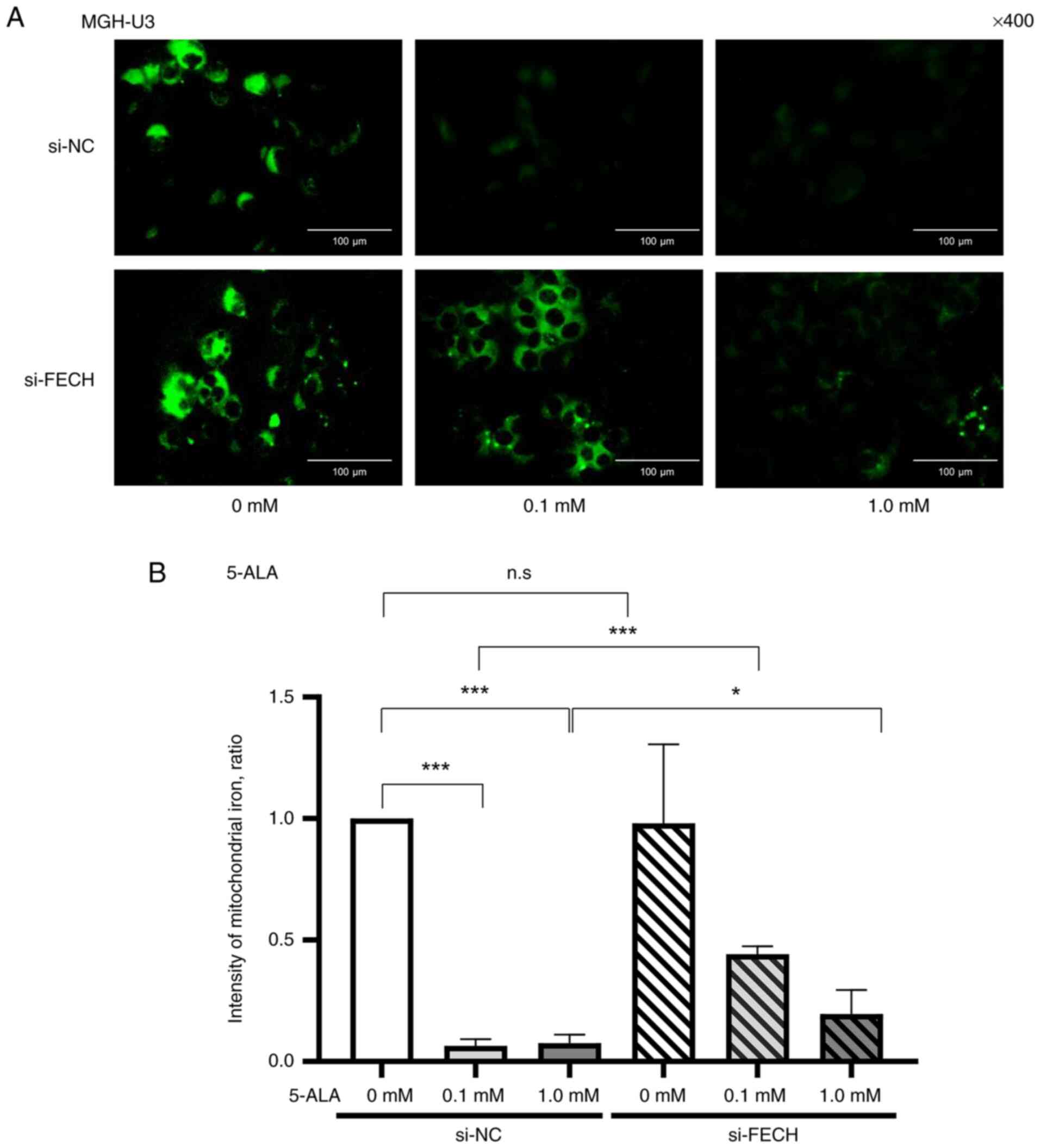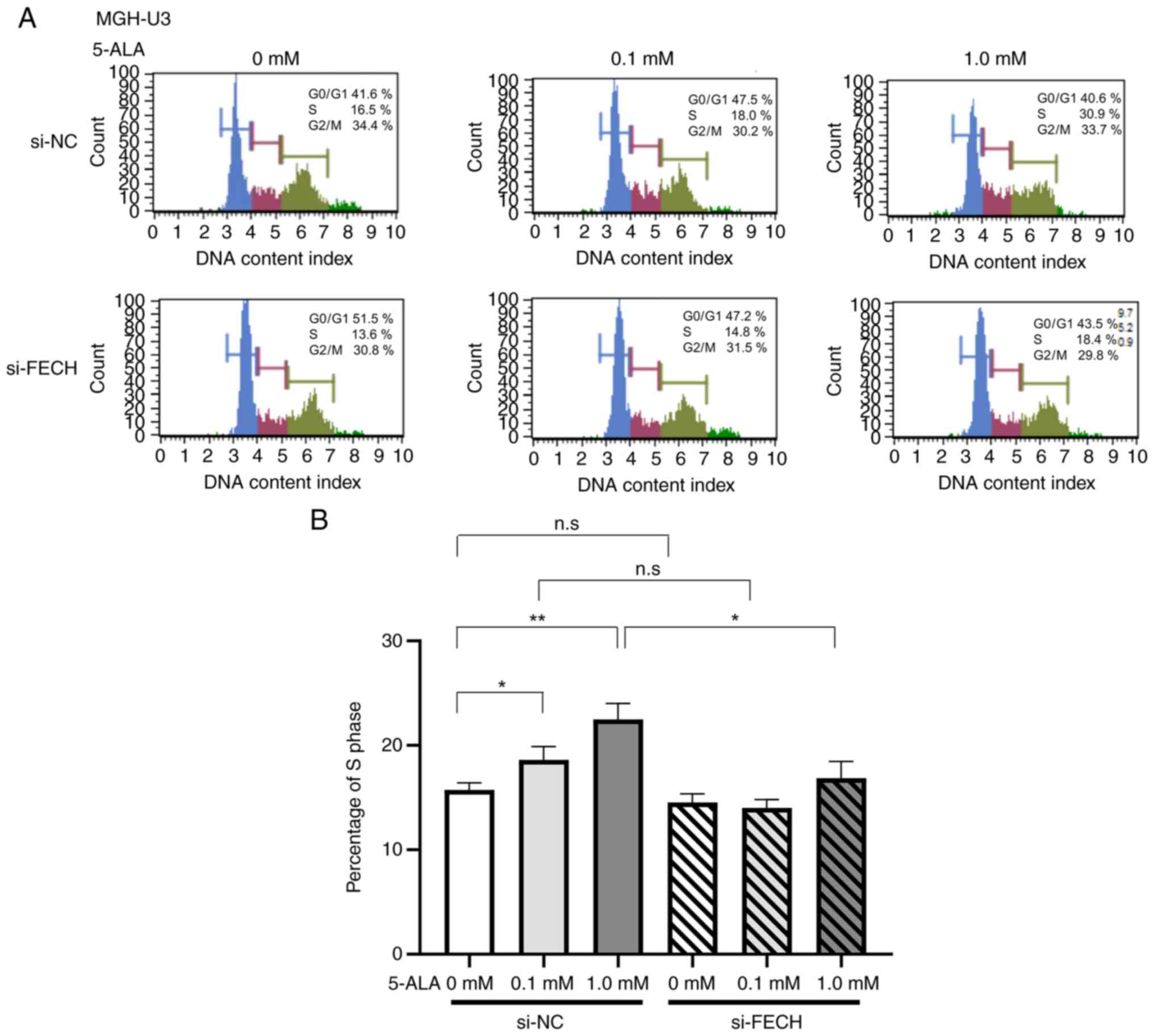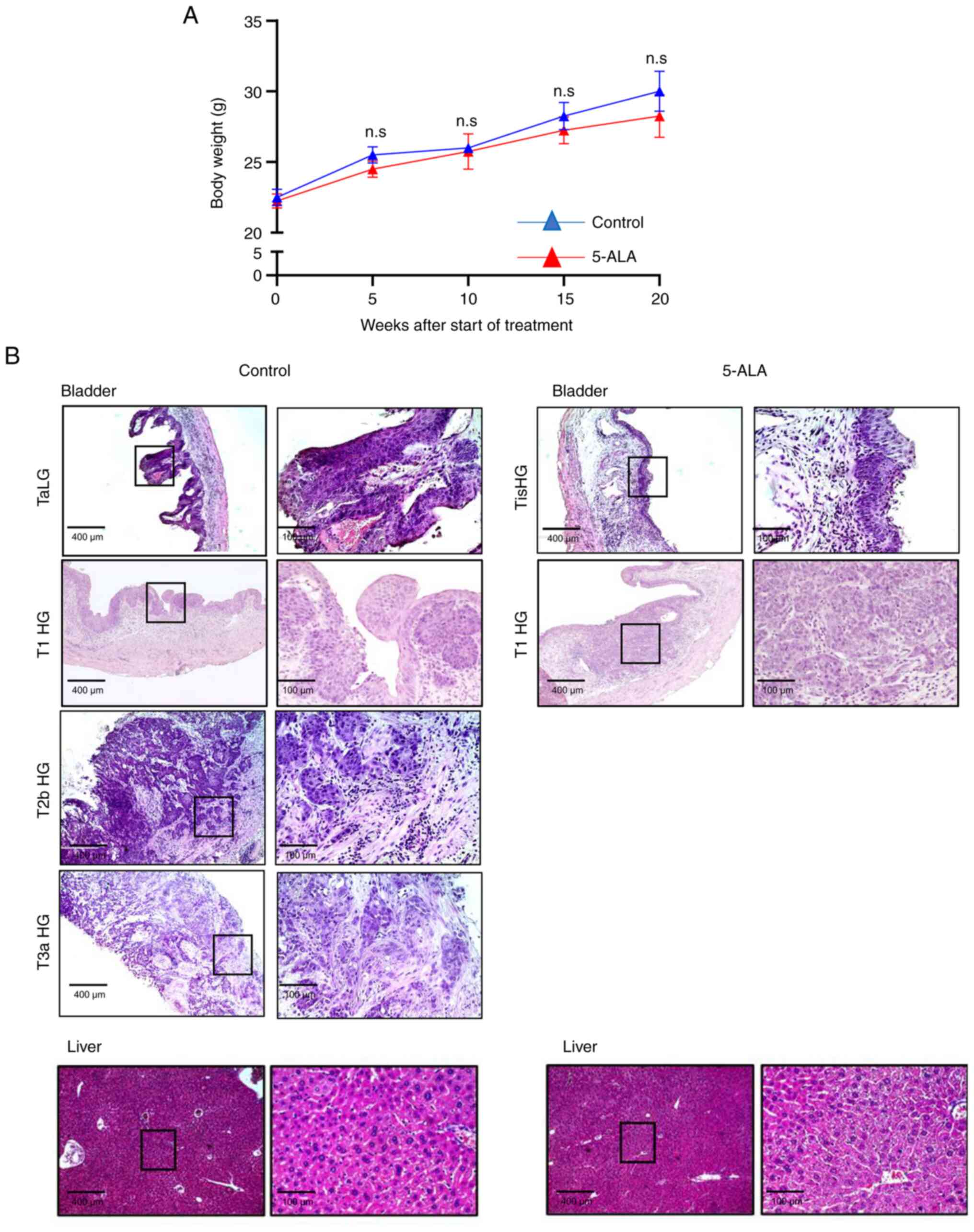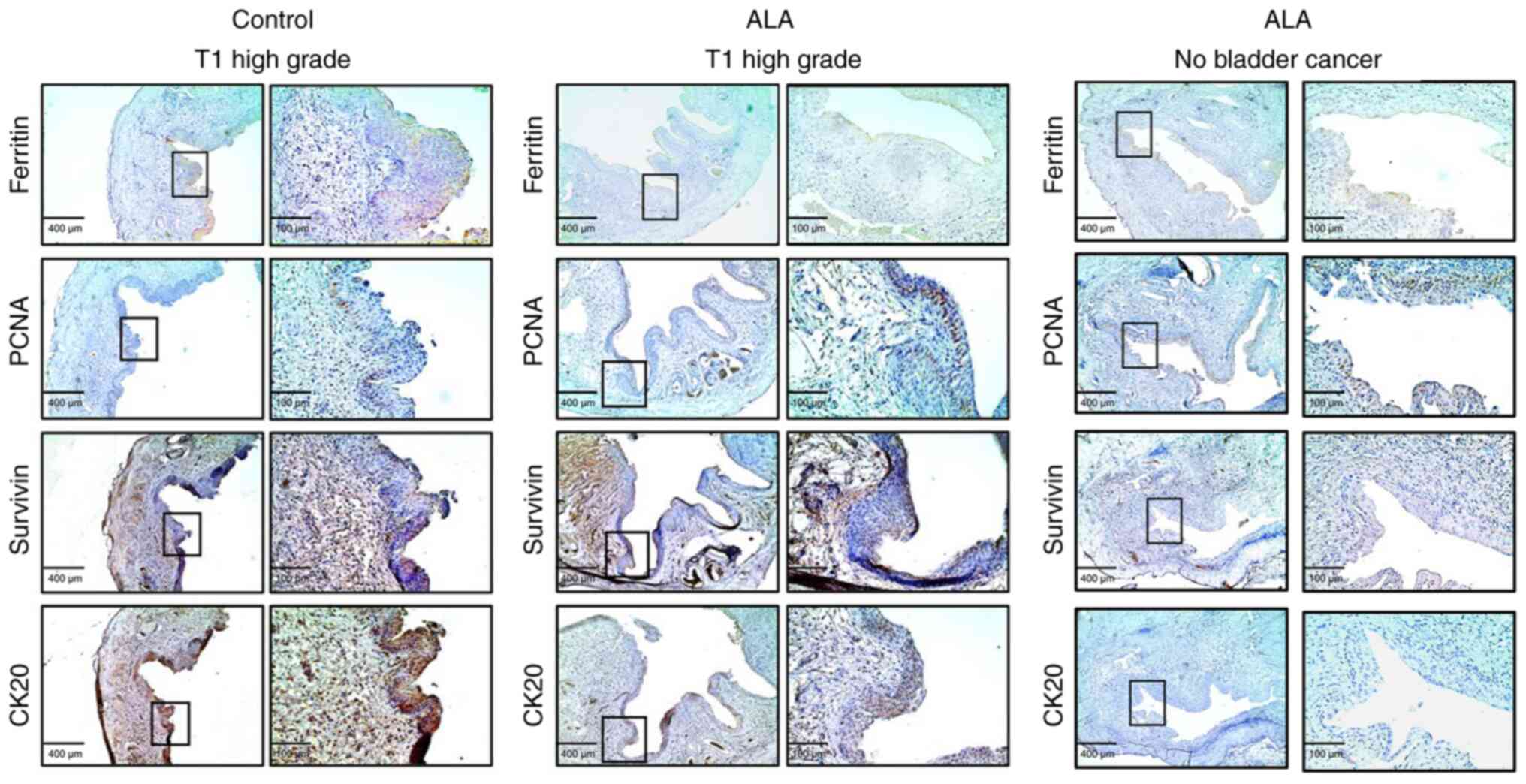|
1
|
Torti SV and Torti FM: Iron and cancer:
More ore to be mined. Nat Rev Cancer. 13:342–355. 2013. View Article : Google Scholar : PubMed/NCBI
|
|
2
|
Campbell JA: Effects of precipitated
silica and of iron oxide on the incidence of primary lung tumors in
mice. Br Med J. 2:275–280. 1940. View Article : Google Scholar : PubMed/NCBI
|
|
3
|
Richmond HG: Induction of sarcoma in the
rat by iron-dextran complex. Br Med J. 1:947–949. 1959. View Article : Google Scholar : PubMed/NCBI
|
|
4
|
Hann HW, Stahlhut MW and Blumberg BS: Iron
nutrition and tumor growth: Decreased tumor growth in
iron-deficient mice. Cancer Res. 48:4168–4170. 1988.PubMed/NCBI
|
|
5
|
Seligman PA, Schleicher RB, Siriwardana G,
Domenico J and Gelfand EW: Effects of agents that inhibit cellular
iron incorporation on bladder cancer cell proliferation. Blood.
82:1608–1617. 1993. View Article : Google Scholar : PubMed/NCBI
|
|
6
|
Lin L, Chen H, Zhao R, Zhu M and Nie G:
Nanomedicine targets iron metabolism for cancer therapy. Cancer
Sci. 113:828–837. 2022. View Article : Google Scholar : PubMed/NCBI
|
|
7
|
Corcé V, Gouin SG, Renaud S, Gaboriau F
and Deniaud D: Recent ad-vances in cancer treatment by iron
chelators. Bioorg Med Chem Lett. 26:251–256. 2016. View Article : Google Scholar : PubMed/NCBI
|
|
8
|
Nakai Y, Tatsumi Y, Miyake M, Anai S,
Kuwada M, Onishi S, Chihara Y, Tanaka N, Hirao Y and Fujimoto K:
Expression of ferrochelatase has a strong correlation in
protoporphyrin IX accumulation with photodynamic detection of
bladder cancer. Photodiagn Photodyn Ther. 13:225–232. 2016.
View Article : Google Scholar : PubMed/NCBI
|
|
9
|
Datta SN, Loh CS, MacRobert AJ, Whatley SD
and Matthews PN: Quantitative studies of the kinetics of
5-aminolaevulinic acid-induced fuorescence in bladder transitional
cell carcinoma. Br J Cancer. 78:1113–1118. 1998. View Article : Google Scholar : PubMed/NCBI
|
|
10
|
el-Sharabasy MM, el-Waseef AM, Hafez MM
and Salim SA: Porphyrin metabolism in some malignant diseases. Br J
Cancer. 65:409–412. 1992. View Article : Google Scholar : PubMed/NCBI
|
|
11
|
Nakai Y, Inoue K, Tsuzuki T, Shimamoto T,
Shuin T, Nagao K, Matsuyama H, Oyama M, Furuse H, Ozono S, et al:
Oral 5-aminolevulinic acid-mediated photodynamic diagnosis using
fluorescence cystoscopy for non-muscle-invasive bladder cancer: A
multicenter phase III study. Int J Urol. 25:723–729. 2018.
View Article : Google Scholar : PubMed/NCBI
|
|
12
|
Warburg O: On respiratory impairment in
cancer cells. Science. 124:269–270. 1956. View Article : Google Scholar : PubMed/NCBI
|
|
13
|
Brown GC: Nitric oxide and mitochondrial
respiration. Biochim Biophys Acta. 1411:351–369. 1999. View Article : Google Scholar : PubMed/NCBI
|
|
14
|
Miura M, Ito K, Hayashi M, Nakajima M,
Tanaka T and Ogura S: The effect of 5-aminolevulinic acid on
cytochrome P450-mediated prodrug activation. PLoS One.
10:e01317932015. View Article : Google Scholar : PubMed/NCBI
|
|
15
|
Miyake M, Ishii M, Kawashima K, Kodama T,
Sugano K, Fujimoto K and Hirao Y: siRNA-mediated knockdown of the
heme synthesis and degradation pathways: Modulation of treatment
effect of 5-aminolevulinic acid-based photodynamic therapy in
urothelial cancer cell lines. Photochem Photobiol. 85:1020–1027.
2009. View Article : Google Scholar : PubMed/NCBI
|
|
16
|
Hara T, Koda A, Nozawa N, Ota U, Kondo H,
Nakagawa H, Kamiya A, Miyashita K, Itoh H, Nakajima M and Tanaka T:
Combination of 5-aminolevulinic acid and ferrous ion reduces plasma
glucose and hemoglobin A1c levels in Zucker diabetic fatty rats.
FEBS Open Bio. 6:515–528. 2016. View Article : Google Scholar : PubMed/NCBI
|
|
17
|
Workman P, Balmain A, Hickman JA, McNally
NJ, Rohas AM, Mitchison NA, Pierrepoint CG, Raymond R, Rowlatt C,
Stephens TC, et al: UKCCCR guidelines for the welfare of animals in
experimental neoplasia. Lab Anim. 22:195–201. 1988. View Article : Google Scholar : PubMed/NCBI
|
|
18
|
Ishizuka M, Abe F, Sano Y, Takahashi K,
Inoue K, Nakajima M, Kohda T, Komatsu N, Ogura S and Tanaka T:
Novel development of 5-aminolevurinic acid (ALA) in cancer
diagnoses and therapy. Int Immunopharmacol. 11:358–365. 2011.
View Article : Google Scholar : PubMed/NCBI
|
|
19
|
Shinoda Y, Kato D, Ando R, Endo H,
Takahashi T, Tsuneoka Y and Fujiwara Y: Systematic review and
meta-analysis of in vitro anti-human cancer experiments
investigating the use of 5-aminolevulinic acid (5-ALA) for
photodynamic therapy. Pharmaceuticals (Basel). 14:2292021.
View Article : Google Scholar : PubMed/NCBI
|
|
20
|
Jung M, Mertens C, Tomat E and Brüne B:
Iron as a central player and promising target in cancer
progression. Int J Mol Sci. 20:2732019. View Article : Google Scholar : PubMed/NCBI
|
|
21
|
Lederman HM, Cohen A, Lee JW, Freedman MH
and Gelfand EW: Deferoxamine: A reversible S-phase inhibitor of
human lymphocyte proliferation. Blood. 64:748–753. 1984. View Article : Google Scholar : PubMed/NCBI
|
|
22
|
Harima H, Kaino S, Takami T, Shinoda S,
Matsumoto T, Fujisawa K, Yamamoto N, Yamasaki T and Sakaida I:
Deferasirox, a novel oral iron chelator, shows antiproliferative
activity against pancreatic cancer in vitro and in vivo. BMC
Cancer. 16:7022016. View Article : Google Scholar : PubMed/NCBI
|
|
23
|
Vazana-Barad L, Granot G, Mor-Tzuntz R,
Levi I, Dreyling M, Nathan I and Shpilberg O: Mechanism of the
antitumoral activity of deferasirox, an iron chelation agent, on
mantle cell lymphoma. Leuk Lymphoma. 54:851–859. 2013. View Article : Google Scholar : PubMed/NCBI
|
|
24
|
Pham CG, Bubici C, Zazzeroni F, Papa S,
Jones J, Alvarez K, Jayawardena S, De Smaele E, Cong R, Beaumont C,
et al: Ferritin heavy chain upregulation by NF-kappaB inhibits
TNFalpha-induced apoptosis by suppressing reactive oxygen species.
Cell. 119:529–542. 2004. View Article : Google Scholar : PubMed/NCBI
|
|
25
|
Karin M: Nuclear factor kappaB in cancer
development and progression. Nature. 25:431–436. 2006. View Article : Google Scholar : PubMed/NCBI
|
|
26
|
Fedi B: Photodinamic effect and
fluorescence in the diagnosis and therapy of the cancer of the
bladder. Boll Soc Ital Biol Sper. 53:1138–1144. 1977.PubMed/NCBI
|
























